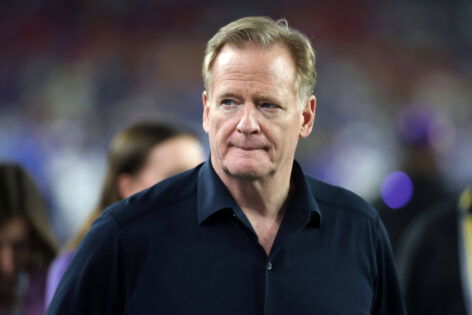Many argue that Roger Goodell’s NFL has always been about control. After all, since taking over as commissioner in 2006, he has taken some harsh decisions. He has arguably cracked down on anything he sees as ‘undermining the shield’—from TD celebrations to uniform tweaks. The league’s strict dress code and fines for on-field antics have become one of the hallmarks. Players learned quickly: step out of line, and the FedEx envelope arrives Monday morning. But one star refused to play by those rules.
After a cheeky jersey stunt during Hispanic Heritage Month, the NFL dropped a $50,000 hammer. Most players would’ve paid up and moved on. Not this guy. Instead, he weaponized the league’s system against them, turning a prank into an all-time power move. What came next wasn’t just rebellion. It was a masterclass in petty, alleged revenge, forever changing how athletes clap back at authority. And it all started with Velcro.
Chad Johnson brought the house down at Stagwell Global Sport Beach this week, reliving the moment he out-pettied the NFL itself. The Bengals legend’s story starts with a joke from Carson Palmer during Hispanic Heritage Month in 2006. “It’d be funny if you just change your name to Ochentay Cinco and put it on the back of your jersey,” Palmer quipped. At first, Johnson brushed it off—until he realized the comedic gold.
A quick Velcro swap later, “Ocho Cinco” debuted during warmups against Atlanta. The NFL’s uniform police missed the prank entirely, until…“I open the envelope and in there there’s a fine for $50,000,” Johnson recalled. The league’s reasoning? Altering the sacred jersey.
But this wasn’t just about money—it was about principle. When appeal officer Rodney Dell upheld the fine, Johnson went nuclear. “So to piss the NFL off, I said well **** you, I changed my name in the offseason.” By 2009, Chad Johnson legally became Chad “Ochocinco,” transforming a $50K fine into a permanent part of NFL lore.
From Velcro to Victory: Chad Johnson’s unlikely NFL legacy
That $50,000 fine in 2006 wasn’t just about Velcro or vanity—it became a tipping point in how the NFL polices player expression. Back then, the league slapped penalties on anything that ‘tainted the shield,’ from end-zone dances to uniform tweaks. When Johnson’s “Ocho Cinco” stunt drew the fine, even his teammates thought it was overkill. Just before kickoff, QB Carson Palmer ripped off the nameplate, sparing him from wearing it in-game—but not from the NFL’s wrath.
The punishment felt personal, especially coming weeks after Johnson’s mohawk disappeared following a failed touchdown promise to DeAngelo Hall. What seemed like another quirky Chad moment exposed a deeper tension: the league’s rigid control versus players’ creativity. Today, the fine looks almost comical. The NFL now allows custom cleats for causes, elaborate celebrations, and even temporary jersey tributes—things Johnson pioneered and paid for. That $50K receipt (over $75K adjusted for inflation) now serves as a relic of a stricter era.
The irony? Johnson’s defiance aged better than the rules he broke. Modern stars like Tyreek Hill and Ja’Marr Chase celebrate freely because Ocho took those early fines on the chin. Even the league’s 2017 celebration rule (where players can celebrate using the football as a prop) reform felt like a quiet nod to his rebellion. That FedEx envelope in 2006 didn’t just contain a fine—it held the receipt for a cultural shift.
Chad Johnson’s $50K fine for the “Ocho Cinco” jersey stunt wasn’t just about the money – it exposed the NFL’s tight grip on player expression during that era. His response, legally changing his name, forced the league to confront its rigid policies. Today’s NFL, where players regularly celebrate with elaborate end zone dances and wear custom cleats for social causes, shows how much has changed.
The post Bengals Legend Clapped Back at Roger Goodell in Iconic Way After NFL’s $50K Punishment appeared first on EssentiallySports.
